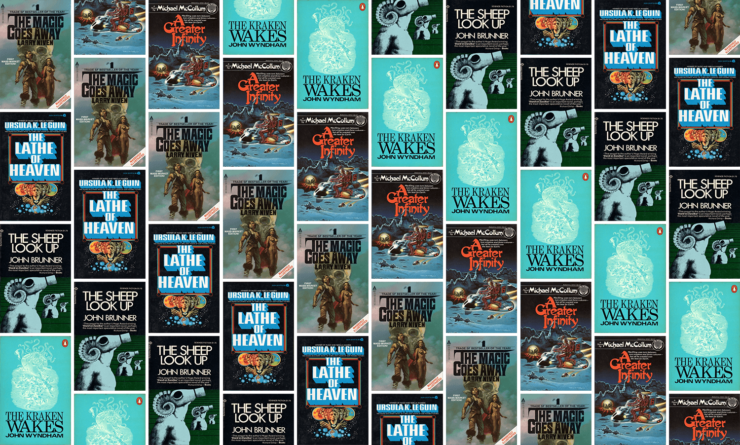As astonishing as this may now sound, industrial development far outran environmental regulation until surprisingly recently. However, by the early 1970s various issues—water pollution, air pollution, resource depletion, the alarming discovery that the main difference between polyester clothing and napalm is the absence of a spark—became so obvious that visionaries like Richard M. Nixon (later noted for innovations in hospitality services such as those offered by the Watergate Hotel) created agencies whose task it was to enforce environmental preservation laws. Presumably this was the end of the matter. Indeed, so confident am I that it was so that I will not even glance out the window to see if these efforts succeeded. No need to even smell the air.
Nevertheless, while nattering nabobs of negativism might have muttered about mass extinctions, anti-terraforming, and the potential self-extermination of the human species, one cannot deny that rising alarm about the changing environment inspired some classic SFF novels.
The Kraken Wakes by John Wyndham (1953)
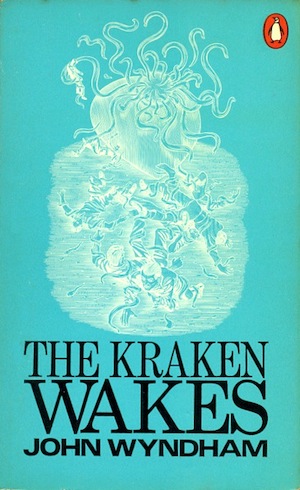
This cozy catastrophe stands out because it’s a rare book in which humans are not to blame for deadly environmental changes. The novel begins quietly, as a meteor shower splashes down in Earth’s oceans. English Broadcasting Company reporters Mike and Phyllis Watson, who document the escalating crisis, see nothing alarming. Initially.
Unfortunately for the former rulers of Earth, the objects were spacecraft, delivering the planet’s new owners to Earth’s oceans. At first these enigmatic beings limit themselves to sampling the inhabitants of an occasional village to better understand their new home. Once they’ve settled in—and particularly once humans attempt to nuke the settlers—the aquatic aliens decide to conduct planetary improvements. Which is to say, they begin melting ice caps, providing themselves with more aquatic lebensraum. This also drowns the coastlines where atom bomb-wielding, land-dwelling pests tend to congregate.
***
The Lathe of Heaven by Ursula Le Guin (1971)
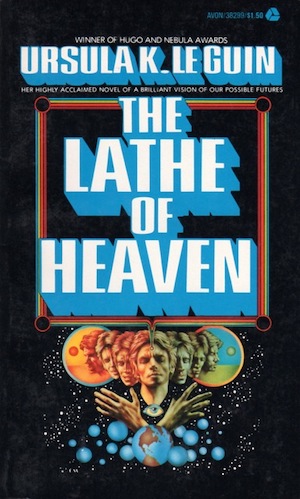
As he is dying in the aftermath of a nuclear war, George Orr discovers that he can dream away the current world, replacing it with a better one. Unfortunately for George, “better than a world in which he is badly burned and waiting to die” is a low bar. The world that replaces the war-torn one is overheated, overpopulated, and marching towards the same mass suicide as George’s original world.
Enter Dr. William Haber. Assigned George as a patient, Haber accepts the reality of George’s dream power. With applied hypnotherapy, Haber sets out to use George as a tool with which to improve a sadly flawed world. What if unforeseen complications of Haber’s fixes present themselves? Well, Haber will simply try again, for as long as it takes to create a perfect world.
***
The Magic Goes Away by Larry Niven (1978)
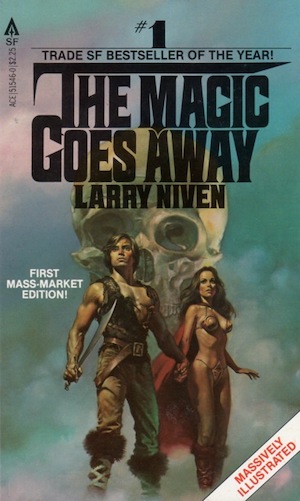
Years ago, the Warlock stumbled across the fact that doomed his magic-rich world. Every mage worth the name cheerfully used the world’s mana to work their spells. The Warlock was the first one to realize that mana was what another age called a non-renewable resource. Once the current reserves were depleted, that would be that for the age of magic. The sword-wielding barbarians would win.
Wizards can look for new lands with as-yet-untapped mana, but Niven’s mages are an implausibly unreasonable lot and they will quickly squander new but finite sources of mana. Very few sorcerers have the self-control to ration limited supplies of mana. It would be best to find some source of mana that even careless humans could not use up. Nowhere on Earth fits the bill. The age of magic appears to be doomed by human folly.
Earth is only one world. To find an unending frontier, one need only look up at the Moon and worlds beyond. What could go wrong?
***
A Greater Infinity by Michael McCollum (1982)
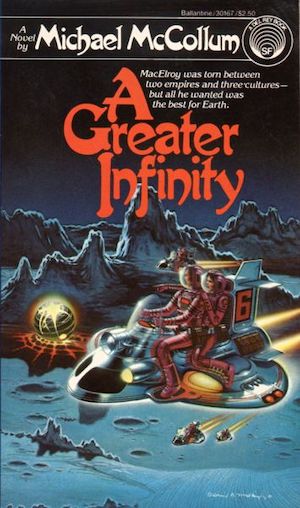
Unremarkable Arizona State University engineering student Duncan MacElroy set out to purchase beer. Thanks to his unfortunate choice in beer-run companions, Duncan ended up drafted into paratime war between worlds occupied by Homo sapiens sapiens and worlds occupied by Homo sapiens neanderthalensis. Violent death in this setting was far more likely than it would have been had Duncan remained on Earth. But life was certainly more exciting.
While the Confederation, Duncan’s adopted civilization, accrues many benefits from an endless frontier of parallel worlds, there is a cost. Which is that, ruling so many worlds, there is no reason to value any particular world. Thus, industrialized worlds are polluted to a degree that would make a Victorian industrialist pale. Unlike Earth, where being constrained to a single world ensures environmentalism out of simple, logical self-interest, the abundant frontiers mean environmental regulations will always be a nonstarter in the Confederation.
***
The Sheep Look Up by John Brunner (1972)
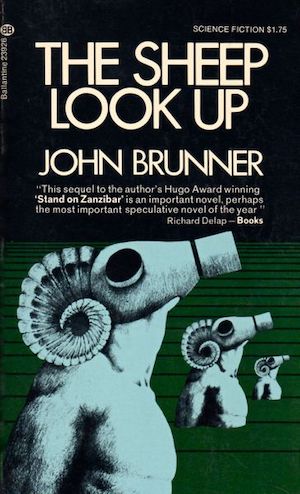
Despite the best efforts of runaway consumerism, the world depicted in Brunner’s The Sheep Look Up is not a utopia. Indeed, it is the very opposite, faced with every possible consequence of short-sighted, ravenous pursuit of wealth. Oceans are poisoned, the air is thick with smog, entire species are vanishing, and the American president, from whom one surely would expect wisdom (…or at least prudence), can offer only snappy platitudes rather than clear-sighted public policy.
Simple logic dictates that an intelligent species presented with the certainty of self-inflicted catastrophe and mass extinction would embrace the necessary steps to sidestep doom. I regret to report Brunner’s humans do not qualify. Too few are motivated to take constructive actions. Indeed, some see environmental degradation as just another money-making opportunity. Small wonder that the novel ends on this gloomy note:
Mrs. Byrne sniffed. Smoke! And if she could smell it with her heavy head cold, it must be a tremendous fire!
“We ought to call the brigade!” she exclaimed. “Is it a hayrick?”
“The brigade would have a long way to go,” the doctor told her curtly. “It’s from America. The wind’s blowing that way.”
The conceit that the smoke from fires would be noticeable thousands of kilometers away is a bit silly, of course [Editor’s note: cough cough], but in Brunner’s hands the final image is quite effective.
***
As I said, there are a great many SFF books with environmental themes. Even though our laws must have forestalled crises of the sort we feared in the 1970s, authors have continued writing such works. Since this list is limited to five books, and many is probably larger than five, there must be quite a few worthy books I did not mention. Comments are below.
In the words of Wikipedia editor TexasAndroid, prolific book reviewer and perennial Darwin Award nominee James Davis Nicoll is of “questionable notability.” His work has appeared in Publishers Weekly and Romantic Times as well as on his own websites, James Nicoll Reviews and the Aurora finalist Young People Read Old SFF (where he is assisted by editor Karen Lofstrom and web person Adrienne L. Travis). He is a four-time finalist for the Best Fan Writer Hugo Award and is surprisingly flammable.










